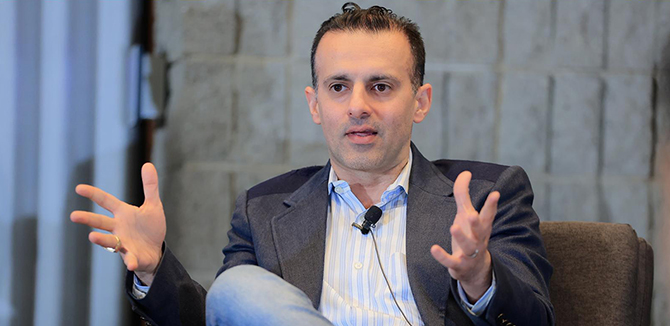Tiny Wearable Detectives
Roozbeh Ghaffari’s participation on a recent MEM panel shines a spotlight on his work developing biosensors that could shape a new future in healthcare.

Roozbeh Ghaffari has a new defense for detecting illicit drugs in athletes.
Ghaffari is the director of translational research at the Northwestern University’s Querrey Simpson Institute for Bioelectronics, and CEO/cofounder of Epicore Biosystems. He recently served as a panelist at the Industry Night held by Northwestern's Master of Engineering Management (MEM) program.
Epicore is developing wearable bio-sensors that provide feedback about a person’s health, including hydration status, perspiration levels, and the presence of banned substances. The company last month announced a partnership with the United States Anti-Doping Agency (USADA) to explore the use of sweat collection as a less-invasive alternative to screen for performance-enhancing drugs.
Ghaffari said his work at both Epicore and Northwestern are focused on pushing biosensors from an academic idea to a commercial success.
“Over the past 10 years, the world has come around to seeing the value that tracking vital signs and various other biometrics could provide,” Ghaffari said. “I’m focused on building out novel biosensors and bioelectronic systems with the mindset of being able to take them to the next step beyond proof of concept and feasibility. How do we turn these new classes of technology into something with commercial potential?”
The Industry Night panel discussion focused on the field of connected health and what its future could look like. Ghaffari said that the future is highly dependent on large biosensor and health datasets to provide the foundation for machine learning (ML) and artificial intelligence (AI) models.
The biosensors that interest Ghaffari would help ensure a level playing field in athletic competition, but, more than that, could help solve healthcare challenges around the world.
“How do we improve healthcare, make it more efficient, and reach more people?” Ghaffari said. “Sometimes we live in a bubble in places like Chicago, Boston, and San Francisco. We may have great healthcare access in certain cities, but it is not everywhere and not available for everyone. And so, how do we increase that reach?”
Biosensors are like tiny detectives that can recognize and quantify specific substances on your body, like proteins and DNA. These wearable devices send information wirelessly for real-time analysis by doctors or artificial intelligence to keep an eye on a person’s health from afar.
Biosensors could serve as early warning bells before costly and life-threatening medical incidents ever occur. Not only would this lower the overall cost of healthcare, but it would allow those who live far from medical clinics to have their health monitored by top doctors or cutting-edge technology anywhere in the world.
Ghaffari said MEM students and the Northwestern community in general play a vital role in making this future a reality.
“For me, just being able to come up with new ideas and then seeing the concepts translate out into future products, that's what gets me up in the morning,” he said. “All of the postdocs, grad students, undergrads, they all contribute to that evolution.”
Specifically, students in the MEM program are gaining the skills that connect engineering and business to ensure the ideas that move forward into development are not only biologically possible but economically feasible.
That makes MEM graduates valuable assets to the work Ghaffari is doing.
“The MEM program can bridge the gaps across the various disciplines,” he said. “You need to have engineers who know how to code or design hardware, but bringing a new solution to market requires the management, the engineering, and the marketing to all come together. That's where the MEM program serves a really powerful purpose.”

